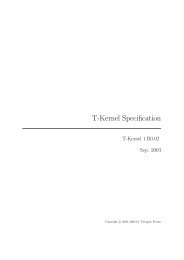[8] 2002 e-business-strategies-for-virtual-organizations
[8] 2002 e-business-strategies-for-virtual-organizations
[8] 2002 e-business-strategies-for-virtual-organizations
You also want an ePaper? Increase the reach of your titles
YUMPU automatically turns print PDFs into web optimized ePapers that Google loves.
e-Business Strategies <strong>for</strong> Virtual Organizations<br />
150<br />
church group, an alumni group, a Rotary Club group and so on.<br />
In everyday living, we take these different community groups<br />
and their different perceptions and expectations <strong>for</strong> granted, and<br />
we change our activities and behaviour accordingly – often<br />
without realizing it. But in a <strong>business</strong> context it makes sense to<br />
pay particular attention to these communities, their rules, and<br />
shared assumptions and knowledge.<br />
Community is largely about collaboration and, in the context of<br />
our interests as system managers, will generally but not<br />
necessarily centre on a common <strong>business</strong> interest. Community<br />
knowledge comes inextricably bound up with culture, which is<br />
a specific shared knowledge area in which the movement and<br />
trans<strong>for</strong>mation of knowledge occurs.<br />
In our discussions, the term ‘culture’ has a broad meaning. We<br />
use this term, not merely in the narrow sense that we talk of as<br />
national cultures, Asian or Western culture, but to refer to the<br />
shared values, perceptions and concepts within any group.<br />
These shared values, beliefs and ways of evaluating the worth of<br />
activities and so on are extremely important <strong>for</strong> understanding<br />
what can be done within an organization or community. In this<br />
sense we refer to a company’s culture, a government culture, a<br />
youth culture and so on.<br />
It is becoming increasingly recognized that it is useful to be aware<br />
of and regard culture as a knowledge asset within the in<strong>for</strong>mation<br />
space. We, as managers, must recognize the place and value of<br />
technological and organizational systems as extensions of<br />
culture. This community knowledge is place and time dependent,<br />
socially constructed and defined in terms of what is understood<br />
as useful and supportive within that context.<br />
Organizational tensions and paradoxes will arise from collisions<br />
of cultures as different communities interpret ‘knowledge’ in<br />
different contexts and at different rates of learning. Cycles of<br />
social learning take place and it is this process of ‘knowing’ that<br />
is of greatest importance to the organization rather than a static<br />
abstract snapshot of knowledge.<br />
Three particularly important characteristics of community<br />
knowledge as opposed to personal knowledge are:<br />
1 The degree to which it can be codified and so move from tacit<br />
to explicit.<br />
2 The degree to which it can be generalized or abstracted.<br />
3 The degree to which it can be shared or diffused throughout<br />
and beyond the organization.


![[8] 2002 e-business-strategies-for-virtual-organizations](https://img.yumpu.com/8167654/169/500x640/8-2002-e-business-strategies-for-virtual-organizations.jpg)












